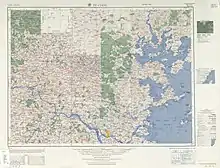Huang-ch'i
See also: Huangchi

Map including Huang-ch'i 黃岐 (AMS, 1954)

Map including Huang-ch'i (AMS, 1954)
English
Alternative forms
- (also from Wade–Giles) Huangchi
Etymology 1
From Mandarin 黃岐/黄岐 (Huángqí), Wade-Giles romanization: Huang²-chʻi².
Proper noun
Huang-ch'i
- (obsolete) Alternative form of Huangqi
- 1965, Union Research Service, volume 39, ISSN 0049-5301, OCLC 1695888, page 89:
- Lien-chiang (連江) grew trees on the barren hill slopes along nearly 100 li of the coasts of the Huang-ch'i (黃岐) peninsular.
- 1969, C.S. Chen, Rural People's Communes in Lien-chiang: Documents Concerning Communes in Lien-chiang County, Fukien Province, 1962-1963, OCLC 1080687758, page 156:
- Commune Members Chou Chin-shui, T'ang I-mao, and Li T'ai-ch'üan made a disclosure, saying: "Last year Li Chao-fang asked us to go to Huang-ch'i to undertake a construction project.
-
Translations
Huangqi — see Huangqi
Etymology 2
From Mandarin 黃芪/黄芪 (huángqí), Wade-Giles romanization: Huang²-chʻi².
Noun
Huang-ch'i (uncountable)
- A Chinese medicinal herb (Astragalus membranaceus)
- 1964, Shiao Pei-Ken Feng Yu-Shou Cheng Ching-Yung Lou Tze-Ching, “BOTANICAL AND PHARMACOGNOSTICAL STUDIES OF THE CHENESE DRUG HUANG-CH'I——Ⅰ. IDENTIFICATION OF THE BOTANICAL ORIGINS AND REVIEW OF THE ANCIENT HERBALS”, in Acta Pharmaceutica:
- Huang-ch'i is one of the famous drug frequently used in the Chinese medicine. In recent years, many substitutes and adulterants for this drug have been found in the market, and the botanic origin of the genuine drug Huang-ch'i still remains unclear both in herbals and in recent literatures.
- 1974, Bulletin of Miscellaneous Information, page 382:
- The Chinese drug Huang-ch'i is in considerable repute all over China .
- 1997 October, Nancy Spaulding-Albright, “A review of some herbal and related products commonly used in cancer patients”, in Journal of the American Dietetic Association, volume 97, number 10:
- Astragalus membranaceus (aka Huang ch'i) has been used widely for thousands of years throughout the Orient to stimulate the immune system.
- 2012, Tao Feiya, “The Evolution of European Missionaries' Views on Chinese Medicine”, in Chinese Studies in History, volume 46, number 2:
- He wrote: “From distant Tibet they bring saffron and sal ammoniac; orange peel and litchis from Canton; mushrooms and huang ch'i from Mongolia; rhubarb from Szechuan, etc."
-